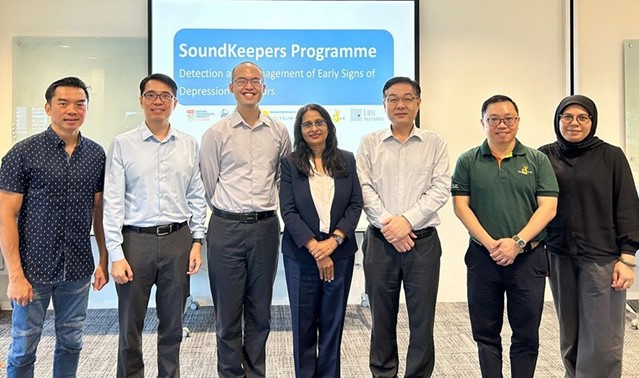Research: AI tool identifying early signs of depression in seniors using voice analysis
 | By Sanjay Devaraja, Editor, LKCMedicine's Redefine Newsletter |
Researchers at LKCMedicine have collaborated with the healthcare and social sectors to develop an AI tool capable of detecting early signs of depression in seniors by analysing subtle cues in their voice samples.

As part of the three-year SoundKeepers research initiative, researchers from LKCMedicine and NTU College of Computing and Data Science (CCDS) will study voice samples collected from participating seniors. These voice biomarkers serve as indicators of mental health and signs of subsyndromal depression (SSD), much like how physical health assessments rely on readings such as temperature or blood pressure. SSD is characterised by the emergence of depressive symptoms that are not severe enough to be diagnosed as major depression.
When at least 630 voice samples have been gathered, the AI voice biomarker will have sufficient data to offer insights into a patient's mental health, specifically in relation to SSD. By analysing acoustic features like pitch, tone, and speech patterns, researchers aim to identify physiological changes that may be linked to mental health decline. This decline often results in alterations to the muscles involved in voice production.
The study analyses voice samples from participating seniors to identify physiological changes associated with mental health decline, such as throat and jaw muscle tension that affects vocal quality. Seniors flagged as at risk for depression are referred to a pilot community-based early intervention programme. This programme provides participants with strategies and techniques to address subsyndromal depression, fostering a supportive environment for mental health care.
Assistant Professor Lee Eng Sing, co-principal investigator of SoundKeepers, said, “With the AI voice tool, primary care physicians will be able to identify seniors with SSD faster, without subjecting them to a battery of questions that may be distressing to seniors. The potential of this new area of research in the field of mental health is immense and represents a paradigm shift in the way medical personnel screen and diagnose depression.”
The SoundKeepers programme will recruit more than 600 seniors aged 55 and above in Hougang and Woodlands to collect their voice samples, which will be used to build an AI algorithm to detect subsyndromal depression (SSD).
The project is supported by several partners, including two institutions from the National Healthcare Group – National Healthcare Group Polyclinics and the Institute of Mental Health – alongside two social service agencies, Fei Yue Community Services and Club HEAL, and the philanthropic organisation Lien Foundation.

